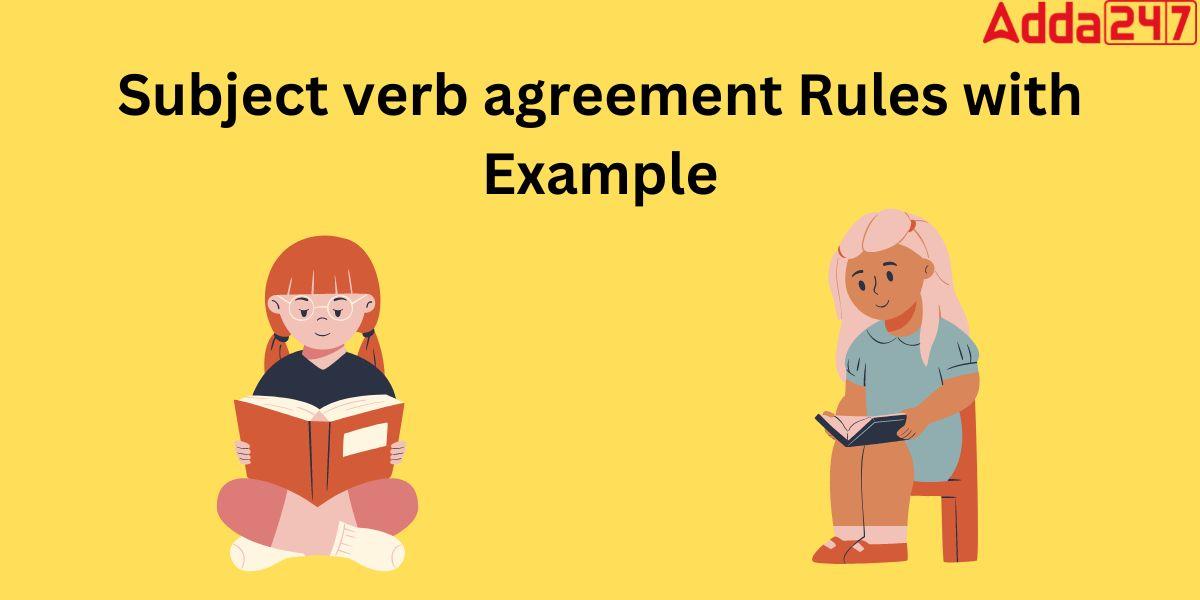Table of Contents
Knowing subject-verb agreement is very helpful to write more clearly and accurately. We know that any conflict is unpleasant for everyone, and sentences are no exception! Every sentence requires a subject and a predicate, but we must also ensure that these two agree. In the grammar field, this is known as subject-verb agreement.
Subject Verb Agreement
Number and tense are the two most prevalent locations where subjects and verbs differ. If the subject is plural, the verb must also be plural. Likewise, if the subject is plural, the verb must also be plural. This may seem obvious, but things can get tricky when talking about money, time, collective nouns, indefinite pronouns, and interrupting sentences.
Know Figure of Speech for Class 10, 12 in English with Examples
Subject Verb Agreement Class 10
The relationship between the sentence’s subject and predicate is referred to as subject-verb agreement. Tense and number must always agree between subjects and verbs. The number, or whether the subject and verb are singular or plural, is the focus of this post.
Subject Verb Agreement Example
- Every night, the light in the lamppost flickers.
Because the subject light is singular in this sentence, the verb that describes the subject’s action must also be singular: flickers. If the subject was plural, the verbs would have to change form to match.
Check some Vocabulary Words with Meaning and Sentence in English
Subject Verb Agreement Rules with Examples
Here we compelled the Subject verb agreement rules with Examples so that students can easily understand the rules.
- Rule 1: If the subject is singular, use a singular verb then.
Example – She teaches every day.
- Rule2: If the subject is plural, there must be a plural verb.
Example – They teach every day.
- Rule3: Use a plural verb when the subject of the sentence is made up of two or more nouns or pronouns connected by ‘and’.
Example – The assistant teachers and the principal teach every day.
- Rule4: When there is only one subject and more than one verb, the verbs must all agree with the subject throughout the sentence.
Example – The crowd shouted, danced, sang, and rocked to the band.
- Rule 5: When a phrase appears between the subject and the verb, remember that the verb still appears to agree with the subject, not the noun or pronoun in the sentence’s following phrase.
Example – The captain as well as the players is very excited about tomorrow’s match.
- Rule 6: Use a singular verb when two or more singular nouns or pronouns are connected by “or” or “nor.”
Example – My mother or father anyone can sign my NOC letter.
- Rule7: When a compound subject includes both a singular and a plural noun or pronoun connected by “or” or “nor,” the verb should agree with the part of the subject closest to the verb. This is also known as the proximity rule.
Example – The students or the class monitor writes every day.
The class monitor or the students write every day.
- Rule8:”each,” “each one,” “either,” “neither,” “everyone,” “everybody,” “anyone,” “anybody,” “nobody,” “somebody,” “someone,” and “no one” is singular words and phrases that require a singular verb.
Example – Each of the students is willing to play football
Example – Noone was there in the class.
- Rule 9: Because abstract nouns and uncountable nouns are regarded as singular subjects, they must be accompanied by a singular verb.
Example – Consistency is the key to success.
- Rule 10: Earnings, goods, odds, surroundings, proceeds, contents, and valuables are examples of countable nouns in English that only have a plural form and require a plural verb.
Example – The earnings from the year 2022 exceed our expectations.
- Rule 11: When writing sentences that begin with ‘here,’ ‘there,’ ‘this,’ ‘that,’ ‘those,’ ‘these,’ etc., keep in mind that the subject comes before the verb, thus the verb must be conjugated with reference to the subject.For instance: Here is your pen.
There have been numerous revisions in our exam schedule. - Rule 12: Use a singular verb when the subject refers to a period of time, a distance, or a sum of money.For example, 4267 kilometres is too far for us to go in half a day.
- Rule 13: The following rule is based on using collective nouns as subjects. When a collective noun is the subject of a phrase, the verb might be singular or plural depending on the sentence and context.For example: I am settled in France.
- Rule 14: When adjectives such as ‘all,’ ‘a lot of,’ ‘lots of,’ some’ are used with nouns to produce a phrase that serves as the subject of the sentence, the verb is utilized in accordance with the noun directly before it.As an example: Some of the books have been ripped and destroyed.
Narration Rules Chart with Examples, PDF in English Grammar
Subject Verb Agreement Exercise
Direction: In each of the following sentences supply a verb in agreement with its subject.
- Shakespeare is one of the greatest dramatists that ______________ ever lived.
- Which one of these books ______________ yours?
- None of the boys ______________ done the sum.
- A group of boys ______________ going on the road.
- Each men and each women____________ given a prize.
- Either you or he_____________ done this.
- _____________ you think I am a fool?
- Mr. Roy together with his children _____________ buying some sweets.
- How happy we____________ here!
- Many of the boys ______________ present in the class.
Direction: Find the Error
- One of the terrorists (1)/ of the Kashmir valley (2)/ are shot dead. (3)/ No error (4)
- Dravid is one of the players (1)/ who has been selected (2)/ for the test match. (3)/ No error (4).
- One of the most (1)/ widely spread (2)/ bad habit is the use of tobacco. (3)/ No error (4).
- My brother-in-law(1)/who lives in Mumbai (2)/ have come to stay with us. (3)/ No error (4)
- They dreamed of a society (1)/ where everyone (2)/ were equal. (3)/ No error (4)
- Three–fourths of the men (1)/ has gone (2)/ to war. (3)/ No error (4)
- When no individual is (1)/ responsible there are no (2)/ sense of responsibility. (3)/ No error (4).
- Whoever(1)/assumes /(2)his statement true is foolish/(3) No error (4)
Subject Verb Concord
Subject verb concord, also known as subject-verb agreement, is a grammatical rule in English (and many other languages) that governs the agreement between the subject and the verb in a sentence. In essence, the verb in a sentence should agree in number (singular or plural) with the subject of the sentence. Here are the basic rules for subject-verb concord:
- Singular subjects take singular verbs, and plural subjects take plural verbs.
- Singular subject: She is a teacher.
- Plural subject: They are students.
- The verb “to be” (am, is, are, was, were) is an exception. It does not follow the standard rule. Instead, it agrees with the subject in terms of person and number.
- I am a doctor.
- He is a doctor.
- They are doctors.
- Compound subjects joined by “and” typically take a plural verb.
- Tom and Jerry are friends.
- When compound subjects are connected by “or” or “nor,” use the verb that agrees with the subject closest to the verb.
- Neither the teacher nor the students are happy.
- Collective nouns can be singular or plural, depending on the context. When the collective noun refers to the group as a single unit, use a singular verb. When it refers to the individual members of the group, use a plural verb.
- The team is practicing. (As a single unit)
- The team are arguing. (Individual members of the team)
- Indefinite pronouns like “everyone,” “somebody,” “nobody,” etc., are typically singular and take singular verbs.
- Everybody wants to go.
- Some nouns that appear to be plural in form are actually singular and take singular verbs. Examples include “news,” “mathematics,” and “physics.”
- The news is interesting.
- Certain words and phrases, such as “each,” “every,” “either,” “neither,” “none,” and “one,” are always singular and take singular verbs.
- Each of the students has a book.
- When a sentence begins with “there is” or “there are,” the verb agrees with the subject that follows.
- There is a cat on the roof.
- There are cats on the roof.
Subject verb concord is an essential aspect of proper grammar, as it helps maintain clarity and correctness in written and spoken communication. Incorrect subject-verb agreement can lead to confusion and grammatical errors.
Subject-Verb Concord Class 10 Notes
Subject-Verb Concord refers to the agreement between the subject and the verb in a sentence. The verb must match the subject in number (singular or plural) and person (first, second, or third person). Here are some key rules:
1. Basic Rule
Singular subject takes a singular verb.
Plural subject takes a plural verb.
Examples:
She is singing. (singular)
They are singing. (plural)
2. Subject Separated from the Verb
When words come between the subject and the verb, the verb must still agree with the subject, not with these intervening words.
Examples:
The bouquet of roses smells lovely. (The subject “bouquet” is singular, not “roses.”)
The quality of the apples was good.
3. Subjects Joined by ‘And’
If two subjects are joined by “and”, they take a plural verb.
Examples:
Ram and Shyam are friends.
The teacher and the student have finished their work.
Exception: If the two subjects refer to the same person or thing, a singular verb is used.
Example:
The captain and coach of the team is arriving soon. (one person is both the captain and coach)
4. Each, Every, Either, Neither
Each, every, either, neither take a singular verb.
Examples:
Each of the students has a book.
Neither of the answers is correct.
5. Subjects with ‘Either…or’ and ‘Neither…nor’
The verb agrees with the subject closest to it (the subject after “or” or “nor”).
Examples:
Either the teacher or the students are going to the museum.
Neither the students nor the teacher is coming.
6. One of + Plural Noun
When “one of” is followed by a plural noun, the verb is singular because the subject is “one.”
Example:
One of the boys has lost his book.
7. Collective Nouns
A collective noun (e.g., team, jury, family, audience) may take either a singular or plural verb depending on whether the group is considered as a single entity or as individuals.
Examples:
The team is winning the match. (as a single entity)
The team are arguing among themselves. (as individuals)
8. Plural Nouns with Singular Meaning
Some nouns are plural in form but singular in meaning, so they take a singular verb.
Examples:
Mathematics is difficult.
News is interesting.
9. Nouns with Singular Form but Plural Meaning
Some nouns are singular in form but plural in meaning, requiring a plural verb.
Examples:
The cattle are grazing.
The police have arrested the thief.
10. Titles of Books, Films, or Entities
Even though they may seem plural, they take a singular verb because they refer to one entity.
Examples:
“The Chronicles of Narnia” is a famous book series.
The United Nations is an international organization.
11. Quantities and Amounts
When referring to amounts of money, time, distance, etc., even though plural in form, they take a singular verb when considered as a unit.
Examples:
Ten dollars is enough.
Five kilometers is a long distance to walk.
12. Relative Pronouns (Who, Which, That)
The verb agrees with the antecedent of the relative pronoun.
Example:
She is one of the players who have scored a century.
Related posts:
| Verb forms | Modal Verbs |
| Active and passive Voice | Preposition |
| Adjective | Common Noun |



 CUET UG Date Sheet 2025 @cuet.nta.nic.in...
CUET UG Date Sheet 2025 @cuet.nta.nic.in...
 UP, MP, CBSE Board Result 2025 Live Upda...
UP, MP, CBSE Board Result 2025 Live Upda...
 NTA NEET Cut Off 2025, Expected Cutoff f...
NTA NEET Cut Off 2025, Expected Cutoff f...










